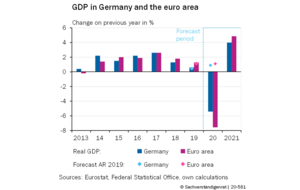Economic policymakers are faced with the task of overcoming the severe recession while also meeting the long-term challenges to the German economy. The German Council of Economic Experts (GCEE) discusses this in its Annual Report 2020/21, entitled “Overcoming the Coronavirus Crisis Together; Strengthening Resilience and Growth”, which it has presented to the German Federal Government today.
The coronavirus pandemic has led to one of the most severe recessions in the post-war period. The sharp fall in the second quarter was initially followed by a strong recovery over the summer. However, “The coronavirus crisis has not yet been resolved.”, Lars P. Feld, Chairman of the GCEE explains. “The economic situation remains fragile due to the sharp rise in infections. How the pandemic can be contained and how foreign economies develop are key to the further development of the economy.”
Overcoming the pandemic-induced recession
In light of the very strong recovery in the summer months, the GCEE has revised its June forecast upwards, and now expects real gross domestic product (GDP) to decline by 5.1 % in 2020 (calendar-adjusted 5.5 %). The recovery is set to continue at a slower pace next year with growth of 3.7 % (calendar-adjusted also 3.7 %). The forecast takes into account the recent further increase in infections and the restrictions on economic activity determined in October 2020.
Economic policymakers quickly adopted extensive monetary and fiscal policy measures, which have supported the economy. The stimulus package will likely help the recovery, but it is not targeted in all areas. As the crisis continues, it would be beneficial to expand the options for tax loss carry-backwards and to allocate the stop-gap support more in line with the extent of impact from the pandemic.
At European level, the recovery fund could increase the resilience and competitiveness of the European Economic Area through targeted investment and reforms in EU member states. As part of a sustainable recovery greater fiscal and monetary policy scope should be opened up in Germany and the euro area, in order to be able to react appropriately to future crises.
Not losing sight of the long-term challenges
Economic support measures should not impede the change towards long-term competitive structures. The expansion of the short-time working scheme (Kurzarbeit) prevented a larger increase in the unemployment rate. However, the duration of short-time work should be intensively used to provide employees with further training and prepare them for future challenges of technological change. Education, training and lifelong learning are vital, particularly in the face of demographic change.
“Although overcoming the pandemic is the main focus at the moment, structural change is another major challenge, but it also offers considerable opportunities. Businesses and households need a clear framework in order to seize these opportunities,” says Lars P. Feld. One possibility is an energy price reform that abolishes the EEG surcharge and lowers electricity tax to the European minimum. This would strengthen the coordination function of the price on carbon emissions and provide better incentives for sector coupling (use of electricity in heating and transport as well as in industry). An internationally coordinated approach is necessary in energy and climate policy.
The coronavirus pandemic has served to boost digitalisation, such as by facilitating working from home, which is helping to cushion the negative effects. At the same time, however, digitalisation deficits have become apparent in healthcare, education and public administration in Germany, which should be eliminated quickly. Further investment in digital infrastructure and a reduction and removal of red tape are necessary to accelerate the diffusion of digital technologies and enable new business models. The measures planned in the economic stimulus package could help in this regard.
Our ageing society and the retirement of baby boomers will significantly increase the burden on social security systems in the future. In the short term, a reinstatement of the ‘catch-up factor’ (Nachholfaktor) could counteract the increase in statutory pension scheme costs. In the long term, increasing the retirement age by linking it to further life expectancy could alleviate the sustainability problem. The increased life expectancy would be split into thirds, with one third extending the pension period, and two thirds the working period.
An international division of labour and cooperation are essential in the current situation and in the long term. Economic recovery in an open economy such as Germany can only succeed if the infection rate outside Germany is also stemmed and the global economy returns to normality. At the same time, new protectionism resulting from the crisis should be opposed.
The EU is enabling its member states to utilise the opportunities of the internal market and act together internationally, such as in security and defence policy. The overriding aim should be to emerge from the crisis stronger together, by promoting productivity and growth and boosting resilience to future crises. The right tool for the further development of the EU would be the longer-term Multinational Financial Framework. The recovery fund, like the other temporary crisis measures, should not be continued permanently without a transparent transfer of power to EU level and a corresponding reduction of sovereignty at member state level.

